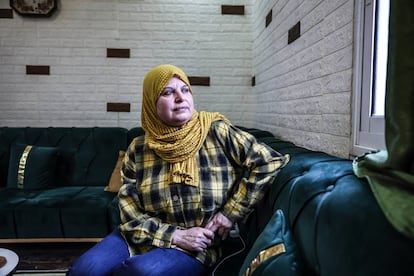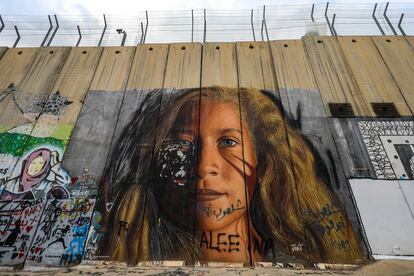Supporting terrorism, throwing stones: The accusations against Palestinians to be freed in Israel-Hamas deal
Most of the prisoners who will be released in exchange for Israeli hostages are teenagers facing ambiguous allegations or being held without charges in ‘administrative detention’


Wisam Marwan Tamimi, then aged 16, was arrested on June 9 in the West Bank town of Nabi Saleh, 20 kilometers (12 miles) from Ramallah, and taken to an Israeli intelligence agency headquarters that has provided grim memories for those who passed through it: the Al-Moskobiya interrogation center in Jerusalem. The high school senior spent 40 days in solitary confinement in a jail where Palestinian prisoners’ support organizations have been denouncing torture for years. He was not provided with a lawyer and was unable to contact his parents. “He had never been in trouble with the law before,” says his aunt, Manal Tamimi, in her living room. After more than a month in complete isolation, the teenager was transferred to Israel’s Ofer maximum security prison in the occupied Palestinian territory of the West Bank. Wisam Tamimi is one of the minors on a list of 300 Palestinian prisoners, at least 150 of whom could regain their freedom through the swap deal involving the Israeli hostages held in Gaza announced on Wednesday by Israel and Hamas.
Manal Tamimi believes it is possible that, as in the case of her nephew, most of the young people who could be released under the Qatar-brokered agreement “have been detained for nothing” on charges “fabricated by the Israelis.” Wisam, she says, was guilty of nothing more than being Palestinian and having the surname Tamimi, “which is a crime in itself for Israel.” Tamimi’s family gained international notoriety when the daughter of one of her cousins, Ahed, then also 16, spent eight months in jail in 2017. The girl had slapped two Israeli servicemen who were both considerably larger than her and who were trying to take her 14-year-old brother into custody. The altercation was captured on video and later went viral.
On November 6, Ahed Tamimi, now 22, was arrested again. However, her name is not on the list of Palestinian prisoners who will potentially benefit from the swap. It only includes those arrested before October 7. Thirty of them are women and there are a few adult men, most of them aged 18, so it is possible that they were arrested when they were still minors.
Wisam’s aunt recalls that, eight days before his arrest, Israeli soldiers “had fractured the boy’s skull” with a rubber bullet thrown on the roof of his aunt and uncle’s house in Nabi Saleh. That June 1, she recounts, Israeli soldiers “had shot a two-year-old boy from the village in the neck when they fired at his family’s car.”
“When we heard the gunshots, we went up to the roof to see what was going on and then the soldiers started throwing tear gas grenades at us. One of them hit Wisam in the head,” she says, showing a video on her cell phone of a Palestinian Red Crescent health worker wiping blood from a deep wound in the skull of the teenager, who spent five days in hospital. Three days after he was discharged, “the soldiers came and took him away,” says his aunt. No explanations, no charges, and no arrest warrant. Her nephew, the woman says, did not have access to a lawyer until 45 days later, when he was transferred from Al-Moskobiya to the Ofer prison.
Since Wisam Tamimi was arrested in June, his parents “have only been able to visit him once or twice or see him in court for five minutes.” The family gave his jailers the medication he needed to treat the skull fracture he had suffered, explains his aunt, only to discover “that they had not given it to him.” Since October 7, neither Wisam nor the other Palestinian prisoners have been able to receive visitors, she adds.

Youth detention
Of the list of 300 minors and women — from which the first 150 prisoners to be exchanged for 50 of the 240 hostages in Gaza will emerge — it is striking to see how young some of them are: there are several children as young as 14. The accusations against them range from serious charges such as “attempted murder” or “supporting terrorism,” to crimes that oscillate between ambiguity - “damage to the security of the area” or “membership of unknown organization” - and the banality of one of the most recurrent allegations: “throwing stones.”
The Israeli prison service declared at the end of September that it had 146 Palestinian children and adolescents in custody at detention centers, prisons or what it cryptically called “security zones,” according to a communiqué from the Israeli human rights NGO B’Tselem. That figure has since more than tripled, with the addition of 350 minors detained in East Jerusalem and the West Bank since Hamas’s attack on Israel, Abdallah Zgari, the president of the non-profit Palestinian Prisoners Club, explains by telephone from the West Bank city of Bethlehem. The arrested minors represent more than 10% of the total of 3,000 detainees in the occupied territories as of October 7, according to this organization. In total, Israeli prisons now hold 8,300 Palestinians, of whom 500 are minors.
The two imprisoned young members of the Tamimi family, Wisam and Ahed, were at least formally charged in court, a right not always enjoyed in Israel, where there is a legal mechanism defined as “administrative detention,” which allows anyone to be arrested without having done anything. Literally. It is enough to suspect someone of planning to commit a crime in the future to send them to prison. This type of detention is open-ended and can be renewed every six months for up to “10 years in prison,” says Zgari.
The victims of administrative detention are held without due judicial procedure, by order of the regional military commander, and on the sole basis of classified evidence that is not disclosed to the accused. Thousands of Palestinians thus find themselves in prison without knowing what they are accused of, or whether they will finally be tried. Nor do they have any idea when they will regain their freedom. Since October 7, of the 3,000 Palestinians arrested, 1,200 have been placed in administrative detention, explains the president of the Palestinian Prisoners Club. That number has been added to an identical number of those already held in such detention before the Hamas attack. In total, 2,400 prisoners, Zgari stresses. Before the Hamas attacks there were already 23 minors held in administrative detention in Israeli prisons, estimates B’Tselem.
According to UNICEF data, since 2000, 13,000 Palestinian children have been arrested, interrogated, tried, and imprisoned. Many had to receive medical treatment after their detention (1,598 in the last decade), suggesting that they suffered some form of mistreatment.
The arrests of Palestinian teenagers “did not start on October 7,” stresses Manal Tamimi, who highlights the gulf between the treatment of Palestinians and Jewish settlers in the Israeli-occupied territories: “Palestinians in the West Bank and Gaza are subject to military law, while settlers living next door are judged by civilian law. If two children, one Palestinian and one settler, throw stones at each other, the Jew will be kept under good conditions until his parents come to take him home. The Palestinian child will be taken to a detention center, where he will be interrogated for hours and deprived of all his rights, such as the right to be accompanied by a parent, to be assisted by a lawyer, or to have his interrogation videotaped,” the activist stresses. This double standard is one of the reasons why Amnesty International and Human Rights Watch accuse Israel of subjugating the Palestinians by imposing an apartheid regime on them.
Sign up for our weekly newsletter to get more English-language news coverage from EL PAÍS USA Edition
Tu suscripción se está usando en otro dispositivo
¿Quieres añadir otro usuario a tu suscripción?
Si continúas leyendo en este dispositivo, no se podrá leer en el otro.
FlechaTu suscripción se está usando en otro dispositivo y solo puedes acceder a EL PAÍS desde un dispositivo a la vez.
Si quieres compartir tu cuenta, cambia tu suscripción a la modalidad Premium, así podrás añadir otro usuario. Cada uno accederá con su propia cuenta de email, lo que os permitirá personalizar vuestra experiencia en EL PAÍS.
¿Tienes una suscripción de empresa? Accede aquí para contratar más cuentas.
En el caso de no saber quién está usando tu cuenta, te recomendamos cambiar tu contraseña aquí.
Si decides continuar compartiendo tu cuenta, este mensaje se mostrará en tu dispositivo y en el de la otra persona que está usando tu cuenta de forma indefinida, afectando a tu experiencia de lectura. Puedes consultar aquí los términos y condiciones de la suscripción digital.








































